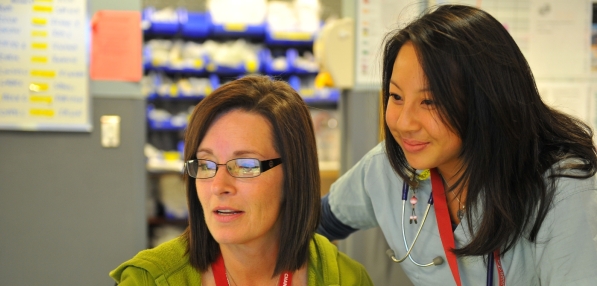Springing back from big changes
Resiliency is something our healthcare professionals know a lot about. You demonstrate it every day by caring for patients in vulnerable, difficult situations and then “springing back” to continue on to the next person and situation.
When the Clinical & Systems Transformation (CST) project is rolled out at your site, it will require you to tap into those same skills.
“Change is happening all the time all around us; it just occurs at differing degrees. CST is certainly an example of change happening at a higher rate and magnitude than normal,” says Cam Brine, Executive Director, Employee Engagement, VCH.
“Healthcare workers often need to move forward in the face of uncertainty or even turmoil and I’m hopeful that the passion our staff has for their work will help them through the transition.”
The transformation will deliver major benefits for your patients, your organization and you – including increased medication safety and improved access to timely patient information. It will also bring about a ‘new normal’ for healthcare professionals.
Shifting from being largely paper-based to a primarily electronic work environment is a major change. It could result in stressful, emotionally and mentally draining situations that are different from those you’re used to dealing with.
Enter resiliency: it’s been proven that people who are more resilient have increased confidence in tough situations. You think more critically, have less stress, are more motivated and experience less fatigue. The more resilient you are, the quicker you’ll adapt to changes and be able to continue providing the best care for your patients.
“Resilience is about self-engagement. It’s about having the courage to be authentic and true to what’s important and to make it possible for others to do the same,” says Ann Brown, Acting Director, Change Initiatives, PHC.
When you start experiencing these inevitable changes, use what you already know works. Here are a few more pointers:
• Set expectations about the change that is coming. Learn as much as you can about the project by checking out CSTproject.ca, talk to your manager and attend CST events.
• Self-care: Do you cook in order to relax your mind? Do you talk it over with a co-worker or a friend? Whatever works for you, take the time to do it.
• Think positively: Learn about the benefits of CST and pick one or two that speak to you. When you’re frustrated or annoyed, think about the benefits and how you are helping your patients by learning and adapting to it.
• Develop a plan: Think through how you want to tackle your next situation. Break up your actions into small chunks (e.g. the next piece of charting you have to do). This will allow you to spend less of your energy pining for the status quo and allow you to focus on learning.
Your effort will be worth it, says Marion Olynyk, Director, Strategic Human Resources, PHSA.
“I believe that through CST we will support our patient care providers in providing a more efficient, effective and high quality experience for our patients.”
Background information
• CST is a joint initiative of VCH, PHSA and PHC, and one of the largest and most complex healthcare projects in Canada. It spans across several areas of the continuum of care, including: acute care inpatient and outpatient units and ambulatory care. As well as creating consistent, leading practices, and a shared clinical information system, CST will deliver HIMSS Level 5 functionality.
• Clinical design teams, made up of hundreds of highly-skilled, multi-disciplinary professionals from across the three Health Organizations and Team IBM (experts from IBM Technical Services, Deloitte, Leidos Solution Builders and the University of Pittsburgh Medical Centre), started work on April 7, 2014. These teams are tasked with designing our future workflows, based on leading practices. In doing so, they are defining the requirements for our new clinical information system.
For more information, please contact Donna Stanton, CST Executive Director/Transformation Lead, VCH at donna.stanton@vch.ca. You’re also invited to submit suggestions for future articles. If you have questions or feedback, please email info@CSTproject.ca.

